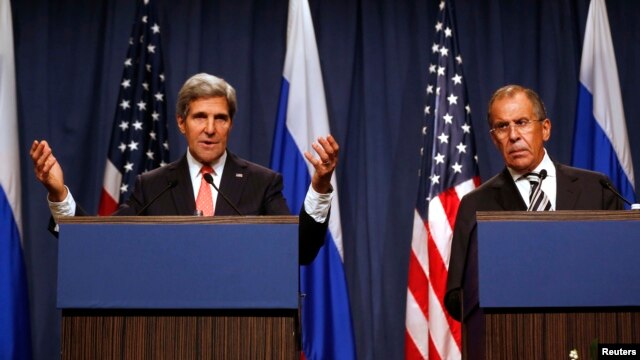US, Russia Agree on Framework for Ending Syrian Chemical Weapons Program
|
|
Date: 9/14/2013 11:53:42 AM
Sender: VOA
|

U.S. Secretary of State John Kerry (L) speaks next to Russian Foreign Minister Sergei Lavrov as they answer questions from the media, following meetings regarding Syria, at a news conference in Geneva, Sept. 14, 2013.[/I]
GENEVA — The United States and Russia have agreed on a framework for ending Syria's chemical weapons program. They will push for a U.N. resolution enforcing that plan without threatening military action.
The agreement requires Syria to make a full declaration of all chemical weapons storage and production sites within one week. It calls for the destruction of production and mixing equipment by November and the elimination or removal of all chemical weapons material and equipment by the middle of 2014.
U.S. Secretary of State John Kerry says it shows Washington and Moscow are committed to ending the Syrian chemical weapon threat "in the soonest and safest manner."
"Providing this framework is fully implemented, it can end the threat these weapons pose not only to the Syrian people but also to their neighbors, to the region, and because of the threat of proliferation, this framework can provide greater protection and security to the world," he said.
While negotiated between the United States and Russia, Kerry says ultimate responsibility for the plan rests with Syrian President Bashar al-Assad. Russian Foreign Minister Sergei Lavrov told reporters here that he has not spoken with Syrian officials since these talks began three days ago, but U.S. officials say they believe Damascus will comply.
The deal could avert a U.S. missile strike in retaliation for the Syrian government's alleged poison gas attack on civilians last month. But it does not insist on the threat of military action in a U.N. resolution to enforce the deal, largely because Russia would have vetoed such a provision.
Lavrov, who disputes President Assad's responsibility for last month's attack, says the deal holds Syrian rebels to the same standards.
Lavrov says that while the main responsibility for security for weapons inspectors rests with the Syrian government, opposition fighters must also respect these protocols without exclusion. Any violation would be put to the U.N. Security Council and the council will take what he called appropriate, concrete measures.
But he says there is nothing in this document about the use of force or about automatic sanctions, simply that violations would be put to the Security Council to deal with accordingly.
In the course of Syria's civil war, Russia and China have three times vetoed tougher action against President Assad.
Kerry says U.S. President Barack Obama reserves the right to use military force to degrade Mr. Assad's ability to use chemical weapons.
"Depending on what Assad does, that possibility exists either within the process of the United Nations or, as it did here, with a decision by the President of the United States and like-minded allies if they thought that was what it came to," he said.
At these talks, U.S. and Russian officials agreed that Syria currently holds about 1,000 tons of chemical agents and precursors including sulfur mustard and sarin gas. U.S. officials believe there are some 45 sites where those munitions and related equipment are stored but admit that Assad forces appear to have moved some of those supplies.
Asked about Syrian rebel claims that some of those weapons are now in Lebanon and Iraq, a senior U.S. official said it is Washington's belief that all of Syria's chemical weapons remain inside the country. |
|
| |
